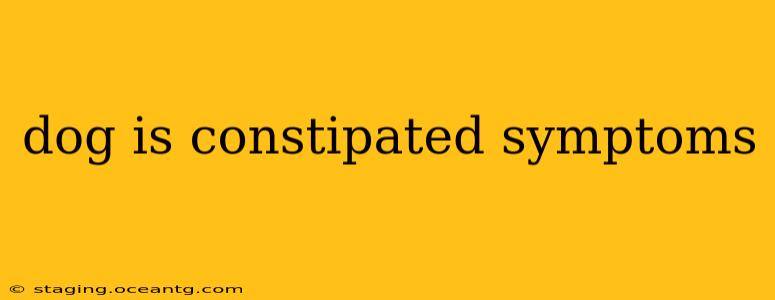Is your furry friend struggling to go to the bathroom? Constipation in dogs is a common problem that can range from mildly inconvenient to a serious health concern. Understanding the symptoms, causes, and treatment options is crucial for ensuring your canine companion's comfort and well-being. This comprehensive guide will walk you through everything you need to know about canine constipation.
What are the Symptoms of Constipation in Dogs?
Recognizing the signs of constipation in your dog is the first step towards effective treatment. While some symptoms are obvious, others might be more subtle. Here are some key indicators to watch out for:
- Straining during defecation: This is often the most noticeable symptom. Your dog may push and strain for an extended period without producing any stool. They might whine or cry out in discomfort.
- Small, hard stools: Instead of the usual soft, well-formed stool, you might notice small, dry, hard pellets.
- Infrequent bowel movements: If your dog's usual bowel movements are significantly less frequent than normal, it could be a sign of constipation. The frequency varies by breed, diet, and age, so pay attention to changes in your dog's routine.
- Loss of appetite: Constipation can sometimes cause a loss of appetite or nausea.
- Lethargy: Your dog might seem less energetic and more tired than usual.
- Abdominal pain: You might notice your dog exhibiting signs of abdominal discomfort, such as restlessness, whining, or licking their abdomen.
- Vomiting: In some cases, severe constipation can lead to vomiting.
- Swollen abdomen: A visibly distended belly might indicate a blockage in the intestines. This is a serious symptom and requires immediate veterinary attention.
What Causes Constipation in Dogs?
Several factors can contribute to constipation in dogs. Understanding the underlying cause is essential for appropriate treatment. Some common causes include:
- Dietary factors: A diet lacking in fiber or containing too much protein can lead to hard stools. Dehydration from insufficient water intake also plays a significant role.
- Lack of exercise: Insufficient exercise can slow down bowel movements.
- Medications: Some medications, such as certain pain relievers or antihistamines, can cause constipation as a side effect.
- Underlying medical conditions: Conditions such as megacolon (enlarged colon), hypothyroidism, and anal gland problems can contribute to constipation.
- Obstructions: Foreign bodies (like toys or bones) or tumors can obstruct the intestines, leading to constipation. This is a medical emergency.
- Stress and anxiety: Changes in environment or routine can sometimes cause constipation.
- Dehydration: Lack of sufficient water intake makes the stool harder and more difficult to pass.
How Long Can a Dog Go Without a Bowel Movement?
The frequency of bowel movements varies between dogs. While some might defecate once or twice a day, others may go every other day without issue. However, if you notice a significant change in your dog's usual bowel habits, especially combined with other symptoms mentioned above, it's best to consult your veterinarian. Don't wait too long, as prolonged constipation can become a serious problem.
How to Treat Constipation in Dogs?
Treatment for constipation depends on the severity and underlying cause. For mild cases, you might try the following:
- Increase water intake: Ensure your dog has access to fresh, clean water at all times.
- Add fiber to their diet: You can add fiber supplements (like psyllium husk) or increase the amount of fiber-rich foods (like cooked pumpkin or sweet potato) in their diet. Always consult your veterinarian before making significant dietary changes.
- Increase exercise: Regular exercise can stimulate bowel movements.
- Give your dog a safe laxative: In some cases, your veterinarian might recommend a safe laxative or stool softener. Never give your dog human laxatives without consulting your vet first.
When Should I Take My Dog to the Vet for Constipation?
If your dog is exhibiting signs of constipation, it's crucial to monitor them closely. Seek immediate veterinary attention if:
- Your dog is straining excessively and showing signs of significant pain or distress.
- Your dog hasn't had a bowel movement in several days, despite trying home remedies.
- Your dog is vomiting.
- Your dog has a swollen abdomen.
- You suspect a foreign body obstruction.
Constipation can be a symptom of a more serious underlying health problem. Your veterinarian can diagnose the cause and recommend the appropriate treatment.
Can I Give My Dog Human Laxatives for Constipation?
No, you should never give your dog human laxatives without consulting your veterinarian. Human laxatives can be toxic to dogs and may have adverse effects. Your veterinarian can recommend a safe and effective laxative appropriate for your dog's size, breed, and overall health.
This information is for general knowledge and does not constitute medical advice. Always consult with a veterinarian for diagnosis and treatment of your dog's health concerns. Regular veterinary check-ups are crucial for maintaining your dog's overall health and well-being.
